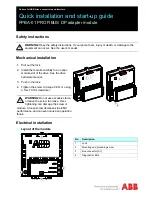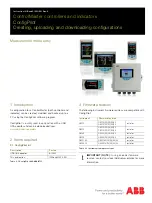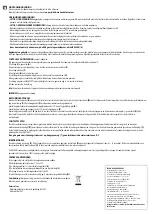
4.1 Mounting
Note
Material damage due to incorrect mounting
Select screws that are suitable for the material of the interlinking block:
– Plastic: Thread-cutting tapping screws
– Metal: Screws with metric thread.
When ordering a single module without a CPX terminal, all required screws
are supplied.
1. Check seal and sealing surfaces. Replace damaged parts.
2. Push the module carefully and without tilting into the interlinking block up to the
stop.
3. Turn the screws into the existing thread.
4. Tighten the screws in diagonally opposite sequence. Tightening torque:
0.9 … 1.1 Nm.
4.2 Dismantling
1. Unscrew screws.
2. Pull the module without tilting out of the interlinking block.
5
Power supply
The operating and load voltage supply is fed in via the interlinking block
(
è
CPX system description P.BE-CPX-SYS-…).
6
DIL switch elements
1
2
3
1
DIL switch 1: Operating mode
2
DIL switch 2:
– Diagnostics mode (remote I/O)
– I/O mode (remote controller)
3
DIL switch 3: Station number
1)
Dependent on the operating mode (
è
DIL switch 1)
Fig. 5
6.1 DIL switch 1: (Operating mode)
Setting DIL switch 1
Operating mode
DIL 1.1: OFF
(Factory setting)
Remote I/O
All functions of the CPX terminal are controlled directly by the
Ethernet POWERLINK controller or a higher-order controller.
DIL 1.1: ON
Remote controller
An FEC or CEC integrated into the CPX terminal controls all
functions of the CPX terminal.
Fig. 6
– The setting of the operating mode via DIL switch 1.1 has priority over all
other settings.
– The switch element 1.2 is reserved and without function.
6.2 DIL switch 2 (diagnostics or I/O mode)
Setting DIL switch 2
Diagnostics mode
DIL 2.1: OFF
DIL 2.2: OFF
(Factory setting)
I/O diagnostics interface
and status bits are switched
off
8 byte I/8 byte O for communic
ation of the bus node with the
CPX-FEC or CPX-CEC.
DIL 2.1: ON
DIL 2.2: OFF
I/O diagnostics interface is
switched on
Reserved
DIL 2.1: OFF
DIL 2.2: ON
Status bits switched on
16 byte I/16 byte O for commu
nication of the bus node with
the CPX-FEC or CPX-CEC.
DIL 2.1: ON
DIL 2.2: ON
Reserved
Reserved
1)
Only in the remote I/O operating mode
2)
Only in the remote controller operating mode
Fig. 7
The diagnostics mode reduces the available address space.
Take account of this fact when planning the CPX terminal.
– Further information can be found in the description for the module
(
è
P.BE-CPX-FB40-…).
6.3 DIL switch 3 (IP addressing)
Static addressing (host ID of the IP address)
12
34
56
7
8
3.8:
3.7:
3.6:
3.5:
3.4:
3.3:
3.2:
3.1:
2
7
=
2
6
=
2
5
=
2
4
=
2
3
=
2
2
=
2
1
=
2
0
=
128
64
32
16
8
4
2
1
12
34
56
7
8
3.8:
3.7:
3.6:
3.5:
3.4:
3.3:
3.2:
3.1:
2
7
=
2
6
=
2
5
=
2
4
=
2
3
=
2
2
=
2
1
=
2
0
=
128
64
32
16
8
4
2
1
Example:
2
0
+ 2
2
= 1 + 4 = 5 (host ID)
Set IP address: 192.168.100.
005
Example:
2
1
+ 2
2
+ 2
5
= 2 + 4 + 32 = 38 (host ID)
Set IP address: 192.168.100.
038
Permitted numbers: 1 … 239
Factory setting: 1
Fig. 8
7
Parameterisation
Note
The CPX terminal and the module described here can be parameterised with the
operator unit (CPX-MMI), the Festo Maintenance Tool (CPX-FMT) software or the
higher-level system.
8
Note on module replacement
Caution
For CPX terminals with a continuously illuminated or flashing Modify LED (M),
parameterisation is not automatically created by the higher-level system when
the CPX terminal is replaced during servicing.
Before replacement, note required settings and make them again after
replacement.
9
Start-up behaviour of the CPX terminal
If the Modify LED (M) lights up or flashes permanently after the system start, “Sys
tem start with saved parameterisation and saved CPX expansion” is set or “Force”
is active.
Additional information on parameterisation, module replacement and
start behaviour can be found in the description (
è
P.BE-CPX-FB40-…).
10
Technical data
Feature
Specification/value
General technical data
è
CPX system description(P.BE-CPX-SYS-…)
Degree of protection through housing
in accordance with IEC 60529, completely
mounted, plug connector in plugged-in status
or equipped with cover caps
.
IP65/IP67
Protection against electric shock
Protection against direct and indirect contact
in accordance with IEC 60204-1
through the usage of PELV circuits (protective
extra-low voltage)
Intrinsic current consumption at 24 V
from operating voltage supply for electronics/
sensors (U
EL/SEN
)
typ. 100 mA (internal electronics)
Separation of network interfaces to U
EL/SEN
Galvanically separated
Mains buffering time
10 ms
Module code (CPX-specific)
Remote I/O
Remote controller
Module identifiers (CPX-MMI, CPX-FMT)
Remote I/O
Remote controller
224 (sub-module code 4)
171 (sub-module code 4)
FB40 Powerlink Remote I/O
FB40-RC Powerlink Node
Network-specific characteristics
Protocol
Specification
Transmission rate
Max. address capacity, inputs/outputs
Cycle time
Answer delay time (PReq/PRes)
Delay time of integrated hub
Crossover detection
Connection length
Ethernet POWERLINK
IEC 617842 (CPF13), IEC 61158
100 Mbit/s, half-duplex operation
64 byte/64 byte (operating-mode-independent)
Min. 600 μs
Max. 10 μs
< 1 μs
Auto-M DI/MDI-X
Max. 100 m
Cable specification
Cable type
Transmission class
Cable diameter
Wire cross section
Industrial Ethernet cable, screened
Category Cat 5
6 … 8 mm
0.14 … 0.75 mm
2
, AWG 22
1)
Observe that connected devices may only satisfy a lower degree of protection or smaller temperature
range, etc.
2)
Cover caps ISK-M12 included in scope of delivery.
3)
Poll-request-to-poll-response
4)
Required for maximum connection length between the network participants.
Fig. 9



















